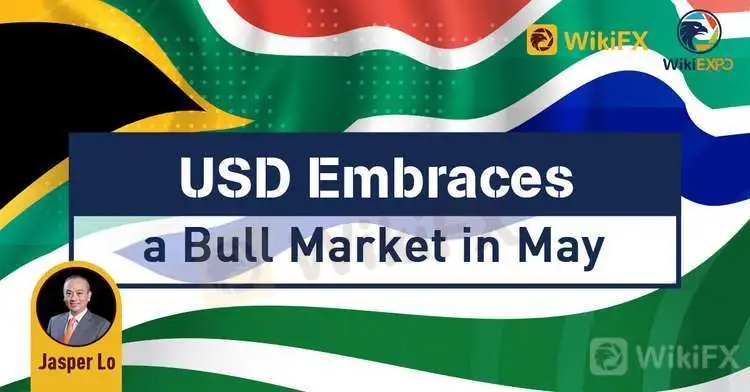简体中文
繁體中文
English
Pусский
日本語
ภาษาไทย
Tiếng Việt
Bahasa Indonesia
Español
हिन्दी
Filippiiniläinen
Français
Deutsch
Português
Türkçe
한국어
العربية
USD Embraces a Bull Market in May
Abstract:GBP saw a rise candlestick pattern that was almost a Doji without subjective to a risky monthly trading chart when April concluded. Its previous increase was partially offset because of its plummet caused by the rapid growth of USD.

GBP saw a rise candlestick pattern that was almost a Doji without subjective to a risky monthly trading chart when April concluded. Its previous increase was partially offset because of its plummet caused by the rapid growth of USD. Great importance should be attached to GBP in May because of the ‘super Thursday’ this week when the Bank of England (BOE) will convene the meeting, and local elections and the parliamentary election will be held in England and Scotland respectively, apart from a seasonal plunge in May encountered by GBP over the past decade.
Throughout the current situation, BOE may keep present monetary policies that are not dovish nor hawkish. As for local elections, it is London mayoral election that draws much attention. The popularity of Shaun Bailey, Conservative Party candidate, is relatively lower than that of Sadiq Khan, incumbent mayor from the Labour Party. In addition, the Labour Party generally surpasses its Conservative counterpart in other local elections. As such, it is believed that Prime Minister Johnson will be forced out of office again, which will give rise to political chaos in the U.K., if Conservative Party loses the election this time.

Speaking of the Scottish parliamentary election, the Scottish National Party (SNP) will enjoy a landslide victory, given no accidents, and the independence referendum will be put on the agenda again. The advent of political confusion will be highly possible as SNP is believed to make up its mind to hold this referendum in autumn, neglecting the British governments objection, even if the U.K. is estimated to absolutely disagree with this campaign. The British administration will not agree with the impending outcome on one hand, and the Scottish Parliament will promote the process of independence based on the related law on the other hand. It is estimated that the aforementioned situation will crash into GBP whose trend is thereby threatened by serious hidden risks. Some people from Hong Kong with the actual demand for GBP are recommended to think twice, making their decisions on purchases in line with the post-election situations after this Thursday.
In most cases, GBP bears witness to the decline in May whereas DXY or USD/non-American currencies often become strong in this month. DXY and USD/GBP enjoyed the increase for 8 times mixed with the decrease for 2 times in May over the past decade. Therefore, under the climate of the strong USD in most cases, its non-American counterparts or forex products are usually weak in May. Here comes a question: Is the strong USD caused by weak non-American currencies or vice versa? No answer can be found at present. With regard to the reasons for the strong USD in May, I will try to unveil them in my forthcoming articles.
Disclaimer:
The views in this article only represent the author's personal views, and do not constitute investment advice on this platform. This platform does not guarantee the accuracy, completeness and timeliness of the information in the article, and will not be liable for any loss caused by the use of or reliance on the information in the article.
Read more

Key Forex Strategies
New to forex trading and looking for simple and effective trading strategies? We got you covered! In this quick guide, we'll explain some of the key forex strategies which are easy to digest. So, let's start!

Fundamental vs Technical Analysis
Fundamental and technical analysis play some of the most influential and critical roles in making trading decisions amongst traders today. They are widely accepted by stock, foreign exchange, indices and cryptocurrency traders worldwide. Traders use either or both of the methods to make key trading decisions in their respective markets.

Going Short of JPY Is Boosted by Yellen’s Remark on Interest-Rate Hikes Again
When interviewed by Bloomberg, Yellen, the U.S. Treasury Secretary, indicated that the USD 4-trillion budget released by Biden would be beneficial to America even if it may increase inflation and interest rates.

Brent oil is predicted of bullish repricing by Goldman Sach
According to Goldman Sachs' head of energy research, a nuclear deal between the U.S. and Iran could send energy prices higher - even if it means more supply in the oil markets. Talks are ongoing in Vienna between Iran and the six world powers - the U.S., China, Russia, France, U.K., and Germany - trying to salvage the 2015 landmark deal. Officials say there's been progress, but the conclusion of the negotiations remains unclear and oil prices have been soaring as a result.
WikiFX Broker
Latest News
Spotware Unveils cTrader Store, Global Marketplace for Algo Creators
Elderly Trader Loses RM2.1M in WhatsApp Forex Scam
Gigamax Scam: Tracking Key Suspects in RM7 Million Crypto Fraud
CFI Partners with MI Cape Town, Cricket Team
Doo Financial Expands Reach with Indonesian Regulatory Licenses
WikiFX Review: Is IQ Option trustworthy?
Quadcode Markets: Trustworthy or Risky?
5 Questions to Ask Yourself Before Taking a Trade
Avoid Fake Websites of CPT Markets
Webull Canada Expands Options Trading to TFSAs and RRSPs
Currency Calculator


